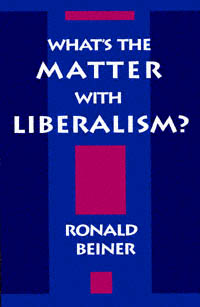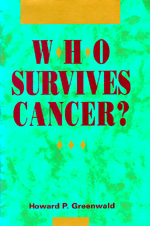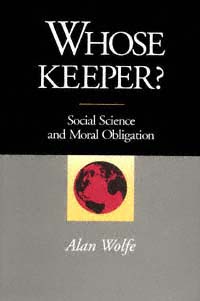formerly eScholarship Editions


|
|
|
|
Your search for
Public
in rights
'Sociology' in subject
found 83 book(s). | Modify Search | Displaying 81 - 83 of 83 book(s) | |
| 81. |  | Title: What's the matter with liberalism? Author: Beiner, Ronald 1953- Published: University of California Press, 1992 Subjects: Politics | Sociology | Political Theory | Social and Political Thought Publisher's Description: In the wake of the revolutions of 1989, the ongoing political turmoil in the Soviet Union, and the democratization of most of Latin America, what is the task of political theorists?Ronald Beiner's invigorating critique of liberal theory and liberal practices takes on the shibboleths of modern Western discourse. He confronts the aridity of liberal societies that possess incommensurable "values" and "rights," but no principles. To Beiner, this neutralist view is both a false description of liberal society and an incoherent political ideal. Rather, he encourages the theorist to remain faithful to the important task of questioning and criticism, instead of serving as a source of ideological reassurance about our own superiority.Beiner looks to the Socratic tradition for guidance. Permitting ethos to replace values, and discourse about "the good" to replace talk about "rights," the theorist is able to reorder social priorities. Considered in this light, the liberal political philosophy of the 1970s and 1980s appears insufficiently Socratic, as does a liberal way of life that presents itself as a model of imitation.Polemical, impassioned, and brilliantly argued, What's the Matter with Liberalism? is essential reading for everyone who cares about contemporary theory and the future of liberal society. [brief] Similar Items |
| 82. |  | Title: Who survives cancer? Author: Greenwald, Howard P Published: University of California Press, 1992 Subjects: Sociology | Environmental Studies | Medicine Publisher's Description: FACT OR FICTION? *A white male earning over $35,000 a year has a better chance of surviving most types of cancer than an unemployed African-American male.*Psychological factors predispose people to contracting cancer and improved emotional health promotes recovery.*Early detection is useless in curing cancer.*Experimental, not conventional, treatments offer the most benefits and longer survival rates to cancer patients.*A scientific breakthrough of practical and immediate significance in cancer treatment is imminent.*Cancer prevention is ineffective in many areas and campaigns will probably never achieve a reduction of cancer mortality approaching 50 percent.*Health Maintenance Organizations (HMOs) increase survival chances for most cancer patients.Howard Greenwald takes an incisive new look at how class, race, sex, psychological state, type of health care and available treatments affect one's chance of surviving cancer. Drawing on an original ten-year survival study of cancer patients, he synthesizes medical, epidemiological, and psychosocial research in a uniquely interdisciplinary and eye-opening approach to the question of who survives cancer and why.Scientists, health care professionals, philanthropists, government agencies, and ordinary people all agree that significant resources must be allocated to fight this dreaded disease. But what is the most effective way to do it? Greenwald argues that our priorities have been misplaced and calls for a fundamental rethinking of the way the American medical establishment deals with the disease. He asserts that the emphasis on prevention and experimental therapy has only limited value, whereas the availability of conventional medical care is very important in influencing cancer survival. Class and race become strikingly significant in predicting who has access to health care and can therefore obtain medical treatment in a timely, effective manner. Greenwald counters the popular notion that personality and psychological factors strongly affect survival, and he underscores the importance of early detection. His research shows that Health Maintenance Organizations, while sometimes prone to delays, offer low-income patients a better chance of ultimate survival. Greenwald pleads for immediate attention to the inadequacies and inequalities in our health care delivery system that deter patients from seeking regular medical care.Instead of focusing on research and the hope for a breakthrough cure, Greenwald urges renewed emphasis on ensuring available health care to all Americans. In its challenge to the thrust of much biomedical research and its critique of contemporary American health care, as well as in its fresh and often counterintuitive look at cancer survival, Who Survives Cancer? is invaluable for policymakers, health care professionals, and anyone who has survived or been touched by cancer. [brief] Similar Items |
| 83. |  | Title: Whose keeper?: social science and moral obligation Author: Wolfe, Alan 1942- Published: University of California Press, 1991 Subjects: Sociology | Ethics | Politics | American Studies Similar Items |